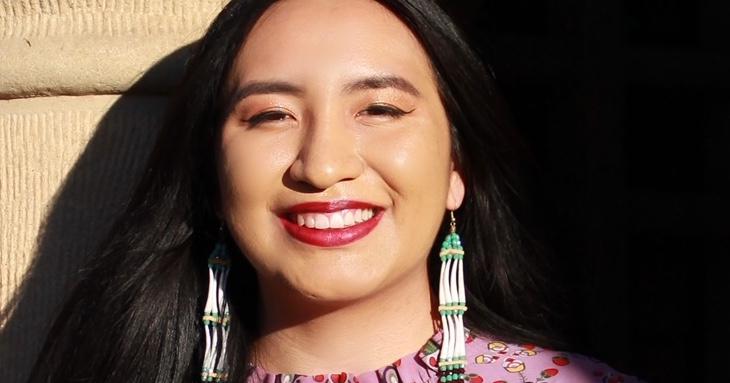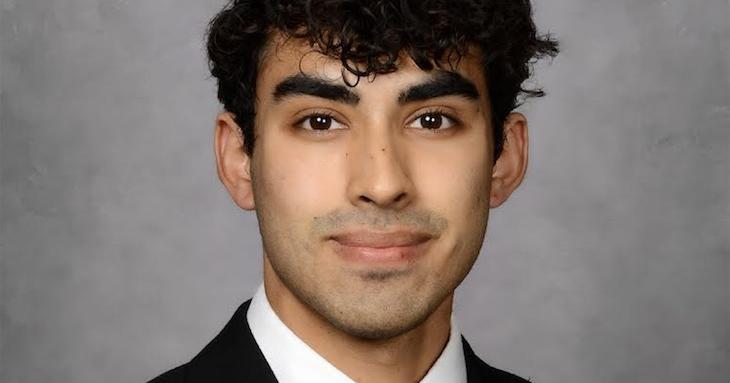-
Navigating Politics on Campus
Whether you’ve been on campus for a month or years, it’s probably safe to say that you’ve met a diverse group of people. Not only may these people be of different races, genders, and ages, they may also have varying political views. Politics can be a difficult area of discussion, but healthy, productive conversations are possible. Here are a few ways to navigate politics and the current social climate on campus.
-
Anpotowin Jensen | Oglala Lakota Nation | Stanford University
I grew up on the Pine Ridge Indian Reservation in South Dakota around traditional ceremonies, learning spirituality from my elders and science from my mother. My parents and grandparents prioritized the Lakota way of life and I always wanted to be like them. They are visionaries, and I’m thankful I was raised to see how innovative, grounded, and hopeful Lakota people are. My Ina (mother) was a single mother who raised my siblings and me while attending school and working full time before she met my Ate’ (stepdad) when I was two years old.
-
Sebastian Diaz | Pasqua Yaqui | University of Arizona
In my family, there are currently three generations of engineers. I am poised to become the fourth. It may seem like I was always destined to be an engineer, but I spent years determining my career path, and even now I don’t feel that it’s set in stone. As a junior at the University of Arizona, I am working toward a degree in biomedical engineering. But I’m not stopping there. My ultimate goal is an MD/PhD, and I am well on my way.
-
Finding Funding: A financial aid checklist
Having detailed conversations about finances can be difficult. But remember that your goal is to get to graduation, and finding the funding you need is essential. Whether you’re feeling ahead or feeling behind — no matter where you are in finding funding — now is the time to learn more. There are many resources and people you can turn to with your questions. If you’re in high school, talk to your counselor. If you’re close to starting college or already there, get to know your school’s financial aid resources.
-
Michael Martinez | Yup’ik | University of Alaska Anchorage
Rare earth elements (REEs) are vital in medicine, electronics, renewable energy, and communications. But extracting REEs is environmentally stressful, with multiple potential supply chain problems. To address this, I created Arctic Biotech Oath (arcticbiotechoath.com), a start-up to develop sustainable biotechnology to extract REEs from mine ore and tailings using microorganisms in a circumneutral pH rather than highly acidic compounds common to traditional techniques.
-
Julia Doucette-Garr | English River First Nation, Cree, and Métis | University of Saskatchewan
I started out at the University of Saskatchewan in biochemistry. For that major, physics was a prerequisite. Although I had taken physics in high school, it wasn’t my favorite subject. I liked biology and chemistry, but the reading in those courses became overwhelming. Physics, on the other hand, included lab work. We learn theories, and then in the lab, we see those theories in action. That helped me understand the material better, and I decided to switch my major to physics.
-
Temerity Bauer | Round Valley Indian Tribes | University of Oregon Clark Honors College
When most people say they want to be a doctor or researcher, they often imply that their parents forced them into it. My parents are professors of history — boy, were they surprised when I came out loving math and science!
-
Finding Work-Life Balance and Managing Stress Through Native Traditions
Today’s professional workplace may seem vastly different from those your elders were a part of. Everyone is looking to work faster, with fewer resources. Regardless of how well-equipped you are, you can easily find yourself overwhelmed, stressed, and sorely lacking work-life balance. While you may not be able to change everything about your work life, look to your Native traditions to help you manage stress and create more balance. Here are a few ways to do just that.
-
Finding Money for College
The college process is daunting. Between standardized tests, submitting applications, and waiting to be accepted, it’s not easy. Once accepted, there’s the question of how you will pay for college. Many Native students do not have enough funds readily available to cover their schooling. That’s where scholarships come in. Today, there are some amazing scholarship opportunities to help Native students on their college journey. Here are a few of the top scholarships to consider.
-
How to Advocate for Yourself (or a Direct Report)
A large part of being successful professionally comes from being able to advocate for yourself. But whether you’ve been working for one year or 10, advocating for yourself or for your direct reports can challenging. Many assume that advocating will lead to conflict or uncomfortable conversations. While those things can happen, they don’t have to. Here are a few ways to advocate for yourself or a direct report.















